March 17, 2025, 2:42 pm | Read time: 3 minutes
Smoking is still the most common cause of lung cancer. Increasingly, however, people who have never been addicted to the vice or at least have not smoked for a long time are also developing the disease. The question of what other factors play a role has long been a subject of research. A study has now shown a link between the type of diet and lung cancer.
Unlike other types of cancer, lung cancer was not associated with diet for a long time. However, for some years now, scientists have been focusing on a possible link. FITBOOK reported on a Chinese study that came to the conclusion that a low-fat diet could reduce the risk of lung cancer.1 A new study now provides evidence that diet can also promote lung the risk of lung cancer.2
Overview
Study on How Diet Can Promote Lung Cancer Risk
The study focused on the relationship between lung cancer and diet, specifically examining the role of glycogen. The body uses this molecule as an energy store to store excess sugar. A carbohydrate-rich diet could, therefore, stimulate glycogen production.
Glycogen accumulation has already been demonstrated in various types of cancer, explained study author Dr. Ramon Sun from the University of Florida (UF) in a press release.3 So, what about lung cancer?
Details of the Study
The methodology of the study used Lafora disease as a model to investigate the effects of glycogen storage on diseases such as lung cancer. This is a neurological disease characterized by an abnormal accumulation of glycogen in brain cells. Knowledge of Lafora disease comes from a 20-year study by study authors Sun and Matthew Gentry.4 The researchers drew on this knowledge to investigate the effects of glycogen accumulation specifically in the context of lung cancer. They used a metabolomics platform developed by Sun that allows precise analysis of the distribution and activity of so-called metabolites (small molecules involved in metabolic processes).
The laboratory models and computer simulations were carried out on mice with lung cancer. The researchers gave them a “Western diet,” as the press release puts it, i.e., a diet high in fat and fructose. This increased the glycogen content in the animals’ blood. The aim was to find out whether this increased glycogen level influenced tumor growth in the animals’ lungs. And this was exactly the case.
Results and Significance
The study showed that in the case of lung cancer, glycogen is an important metabolic factor that promotes tumor growth — comparable to a “giant lollipop that stimulates the sweet tooth of cancer.” This is what the press release says. The term ‘sweet tooth’ is a common metaphor that describes a fondness for sweets, akin to the term ‘sugar craving.’
The research team concludes that a diet high in fat and sugar increases glycogen levels in the body and thus provides building blocks for the growth of cancer cells. Conversely, according to Sun, glycogen accumulations are an important indicator of the progression of lung cancer. The findings could also be beneficial for treatment. According to study author Gentry, there are several drugs originally developed to treat Lafora disease that affect glycogen levels in the body.
The researchers also emphasize that a “nutrient-rich diet” plays an important role. Improving food choices could, therefore, contribute effectively to the prevention of lung cancer. In addition, maintaining an active lifestyle and reducing alcohol consumption are fundamental strategies for long-term health. And, of course, giving up smoking.

In large quantities Not just alcohol! 6 things that are harmful to the liver

Often Unrecognized! Why Visceral Fat Can Also Be a Problem for Slim People

Study shows A severe coronavirus infection can possibly shrink cancer tumors
Limitations
The study was conducted on mice, so it is questionable to what extent the results can be transferred to humans. It is also a limitation that the researchers focused exclusively on glycogen. Other diet-related and additional factors that could influence the risk of cancer were not taken into account.

